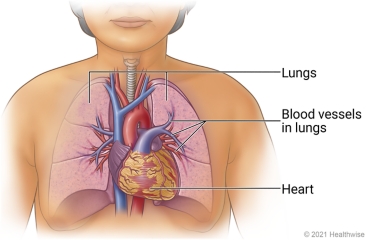What is hypoxemia?
Hypoxemia means that you don't have enough oxygen in your blood. Your blood carries oxygen from your lungs to all parts of your body through your blood vessels. Hypoxemia is a result of diseases that affect your heart, lungs, or blood. These include heart failure, COPD, and anemia. Being at high altitudes can also lead to hypoxemia.
What happens when you have hypoxemia?
Oxygen gets into your blood through your lungs. Your blood carries the oxygen to all parts of your body. When you have too little oxygen in your blood, your body doesn't get enough of it. With too little oxygen, your heart, brain, and other parts of your body don't work very well.
What are the symptoms?
In addition to the symptoms of whatever is causing your hypoxemia, you may:
- Get tired quickly.
- Be short of breath when you are active.
- Feel like your heart is pounding or racing.
- Feel weak or dizzy.
- Become confused.
How is hypoxemia treated?
Your doctor will do tests to find out how much oxygen is in your blood. Your doctor will look for the cause of your hypoxemia and treat that problem. For example, if you have heart failure, you may need medicines that help your heart pump better.
- If your hypoxemia is not severe, your doctor may give you oxygen through a mask or nasal cannula (say "KAN-yuh-luh"). A cannula is a thin tube with two openings that fit just inside your nose.
- If your hypoxemia is severe, you may have a breathing tube put into your windpipe. The breathing tube is attached to a machine that pushes air into your lungs. This machine is called a ventilator.
- If you have a long-term problem with hypoxemia, your doctor may recommend that you use oxygen regularly. Some people need it all the time. Others need it from time to time throughout the day or overnight. Your doctor will tell you how much oxygen you need and how often to use it.
Follow-up care is a key part of your treatment and safety. Be sure to make and go to all appointments, and call your doctor if you are having problems. It's also a good idea to know your test results and keep a list of the medicines you take.
Current as of: September 29, 2025


